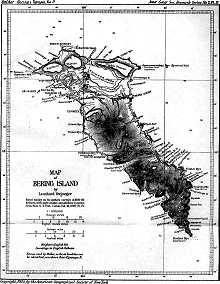The Discovery of Steller's Seacow (contd.)
The expedition was now running out of provisions, and Bering decided to abandon the expedition and start the journey home to Kamchatka. This became a three months odyssey with fog, storm, foul water and food, and scurvy. Bering was severely ill confined to his cabin, and several sailors died, until on the 5th November the vessel wrecked on an unknown coast.

The crew did not realize at once that they were caught on an uninhabited barren island, on which they had to spend a long arctic winter under harsh and hopeless conditions.
On one of his first excursions along the unknown shore Steller discovered:
Fortunately driftwood was available to build primitive pit huts and for making fire, and
the grouse and sea otter were easily caught for food. But most men were very
much weakened by scurvy, and several more of them died a miserable death. On the
8th December Vitus Bering also passed away
"in the open and almost eaten up by lice*)Steller
in a letter to Gmelin".
During spring the remaining crew members recovered, as Steller could "prescribe" herbs containing vitamins, and fresh meat. Waxell wrote
*)translated from Tsarskoje Selo manuscript:
"only since we ate her [the seacow's] meat, we recovered fully". Steller himself stayed healthy during the whole voyage. On his previous stay in Kamchatka the native Itelmens had taught him how to utilize the local herbs.
In spring the survivors started to dismantle the St. Peter and build a small sailing boat to bring them home to the mainland. Meanwhile the unscrupulous hunting had scared off all animals at a distance of 20 kilometers around the camp. Under these circumstances Sven Waxell, who was in command after Bering's death, wrote
*Tsarskoje Selo manuscript, Buechner 1891, Page 22:
"Ich würde den gezwungen, Ein ander Hülfsmittell, zu unserer nahrung ausfündig zu machen: die bestunde darin; wir sahen alle tage, recht gegen unsere wohnplats, Ein ziemlich Partie Sea Kühe, oder Manates ins Wasser gehen." [of necessity
I had to look for another food source, which consisted of Seacows or Manatees, which we saw in great numbers near our camp]
